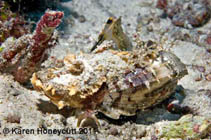| Family: |
Synanceiidae (Stonefishes), subfamily: Choridactylinae |
| Max. size: |
25 cm TL (male/unsexed) |
| Environment: |
reef-associated; marine; depth range 15 - 60 m |
| Distribution: |
Eastern Indian Ocean: Andaman, India and Nicobar islands. Western Pacific: Thailand, Australia, Papua New Guinea and New Caledonia. |
| Diagnosis: |
Dorsal spines (total): 17-17; Dorsal soft rays (total): 8-9; Anal spines: 2-2; Anal soft rays: 11-12. Description: Characterized by having variable colors from yellowish to mottled brown; broad black band across middle portion of inner surface of pectoral fin and dark area covering upper basal portion of fin; first three dorsal spines broadly connected with membrane, remaining spines with membrane only at one-fifth basal part; lower two pectoral rays free of membrane; absence of scales; slightly elevated eyes; longer snout than postorbital length; depth of body 3.4 in SL (Ref. 90102). |
| Biology: |
Seldom noticed because of its efficient camouflage. Inhabits sand, rubble and mud bottoms in 15-60 m (Ref 90102). |
| IUCN Red List Status: |
Least Concern (LC); Date assessed: 04 February 2009 Ref. (130435)
|
| Threat to humans: |
venomous |
Source and more info: www.fishbase.org. For personal, classroom, and other internal use only. Not for publication.
